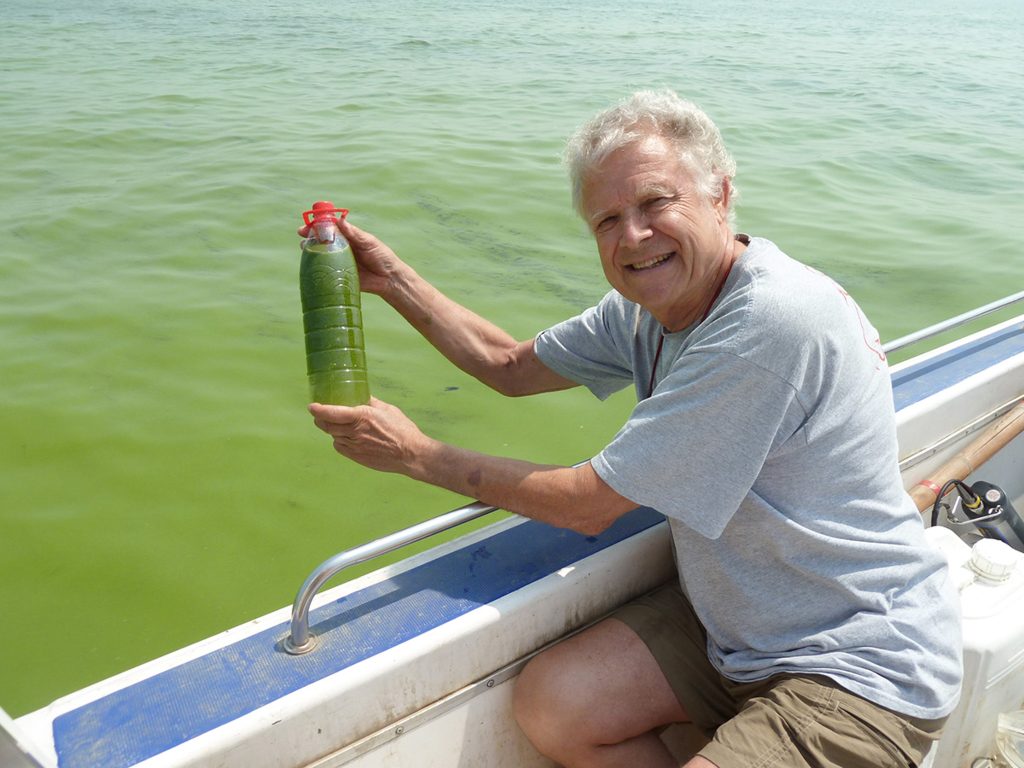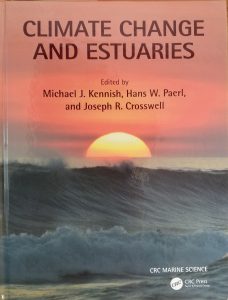
Bookmark This is a feature that highlights new books by College of Arts and Sciences faculty and alumni, published the first week of each month. This month’s featured book is Climate Change and Estuaries (Routledge Taylor & Francis Group), edited by Michael J. Kennish, Hans W. Paerl and Joseph R. Crosswell.
Paerl, William R. Kenan Professor of Marine and Environmental Sciences at UNC-Chapel Hill, spoke with us about the book.
 Q: Can you give us a brief synopsis of your book?
Q: Can you give us a brief synopsis of your book?
A: Climate change is exerting increasing pressures on our ecologically and economically important coastal, estuarine and marine environments globally. This book provides state-of-the-art coverage of climate change effects on estuarine ecosystems from local, regional and global perspectives. With editors among the most noted international scholars in coastal ecology and estuarine science and contributors who are world-class in their fields, the chapters in this volume consist of comprehensive studies in coastal, estuarine and marine sciences, climate change and coastal management. The contributors provide an extensive international collection of data in various formats useful for coastal scientists, planners and managers. The book not only examines climatic and non-climatic drivers of change affecting coastal, estuarine and marine environments, but also their interactions and effects on populations of organisms, communities, habitats and ecosystem structure and function.
Q: How does this fit in with your research interests and passions?
A: My collaborative research addresses microbially mediated nutrient cycling and primary production dynamics, environmental controls and management of harmful algal blooms and their toxins. It also assesses the effects of human and climatic alterations of water quality and the sustainability of inland, estuarine and coastal marine waters in the U.S. and globally. I am specifically interested in how human activities and climatic factors and changes interact to alter water and habitat quality along the freshwater to marine “continuum” and the steps we can take, starting in the watersheds and airsheds, to mitigate these changes. This book provides the opportunity to address these issues, providing insights and solutions from physical, chemical and biological experts linking the impacts of our rapidly changing climate to biogeochemical, ecological and economic conditions and the sustainability of these waters.
 Q: What was the original idea that made you think: “There’s a book here?”
Q: What was the original idea that made you think: “There’s a book here?”
A: My colleagues, Mike Kennish and Joseph “Joey” Crosswell, have had long-standing interests and research addressing environmental changes impacting coastal waters as mediated by human and climatic forcings. Mike is interested in characterizing and protecting our coastal resources, Joey is interested in the effects of climatic perturbations (tropical and subtropical cyclones), and my work addresses the impacts of nutrient and other pollutant impacts on water quality. It seemed like a “natural” for us to get together to address these issues with the help of our colleagues in respective research areas covering this interdisciplinary global challenge.
Q: What surprised you when researching/writing this book?
A: The biggest surprise was the enthusiasm and commitment from our colleagues in contributing to the book, fully recognizing its overall importance of understanding how estuarine and coastal systems “work” and are susceptible to yet exhibit resilience in the context of changing climatic pressures. Additionally, I was surprised at how well the natural and social sciences could be integrated in assessing and protecting key estuarine and coastal resources.
Q: Where’s your go-to writing spot, and how do you deal with writer’s block?
A: I prefer writing as a means of initially expressing thoughts, perspectives and priorities in a stream-of-consciousness manner, getting the “big picture” in place early on and filling in the blanks as the work matures. I don’t rely on a detailed outline until the fundamental building blocks are in place from which to add detail and synthesis. My favorite hideaway is at home, in my recliner, with our “assistant” orange tabby cat, Mr. T. (for Trouble), snuggled up next to my laptop.
Paerl is based at the Institute of Marine Sciences in Morehead City; IMS is part of the department of earth, marine and environmental sciences in the College.
UNC will celebrate University Research Week Oct. 23-27, with a theme of “A Climate of Change at Carolina.” Watch a video about University Research Week. *Paerl will speak at this “Lunch and Learn” event.
Nominate a book we should feature by emailing college-news@unc.edu. Find previous “Bookmark This” features by searching those terms on our website.
